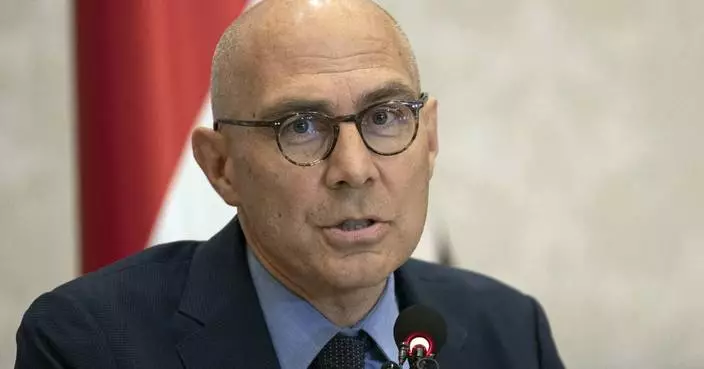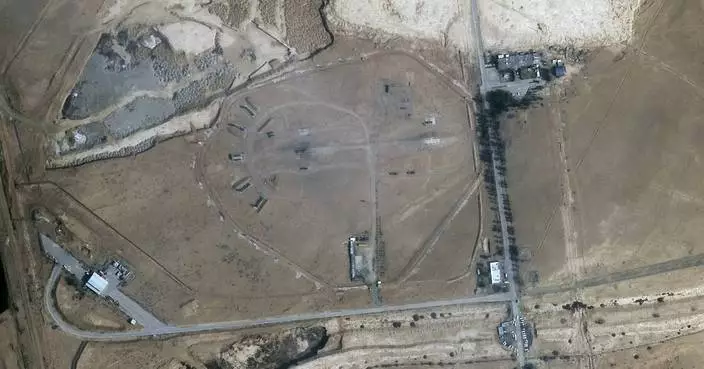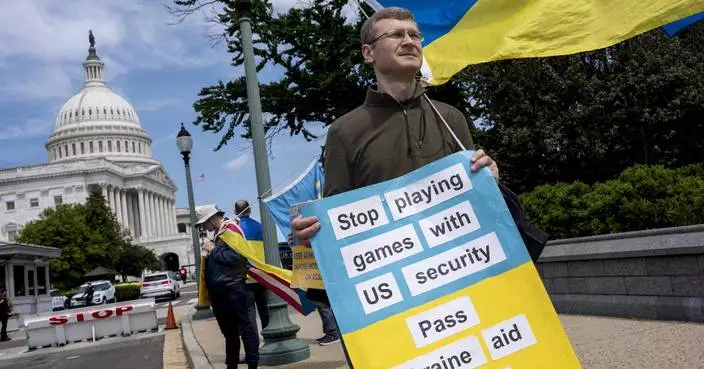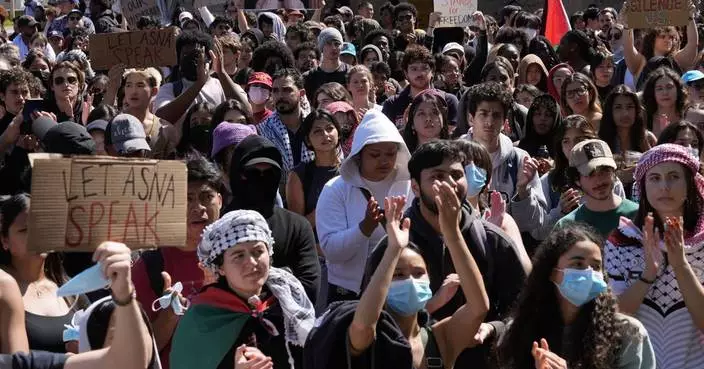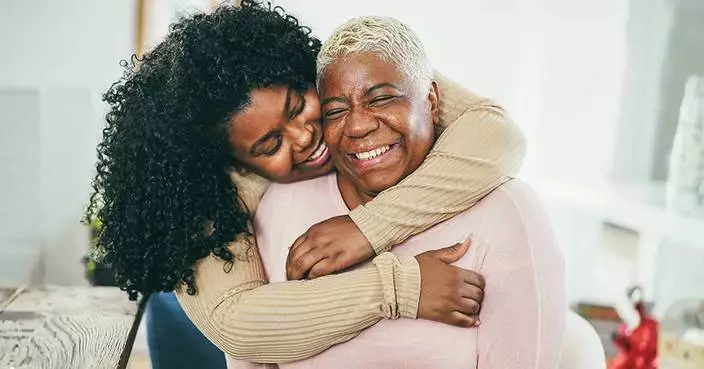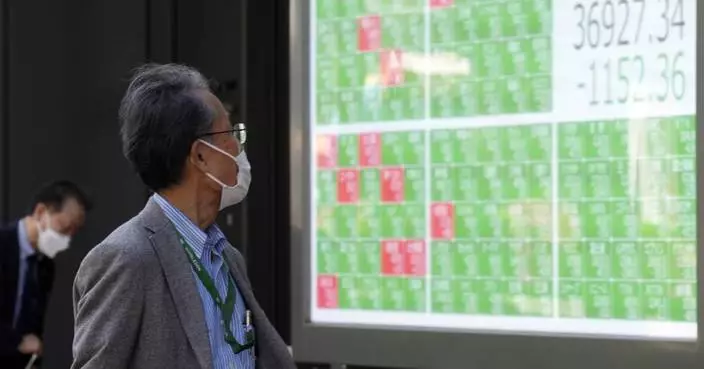Israel's defense minister said Saturday that Hamas leaders are the "only culprits" in continued bloodshed on the Gaza border, as the European Union and a top United Nations official made new demands to investigate shootings of unarmed Palestinians by Israeli soldiers, including the killing of a 14-year-old boy.
Avigdor Lieberman's comments on Twitter came a day after four Palestinians, including the teen, were shot and killed by Israeli army fire from across the border fence, according to Gaza health officials.
Click to Gallery
Raeda Ayyoub, the mother of Mohammed, 14, who was killed during a protest along Gaza's border with Israel, east of Jebaliya Yesterday, reacts while sits near her husband Ibrahim, during interview at her family house in Jebaliya refugee camp, Gaza Strip, Saturday, April 21, 2018.(AP Photo/Adel Hana)
Ibrahim Ayyoub, 42, the father of Mohammed, 14, who was killed during a protest along Gaza's border with Israel, east of Jebaliya Yesterday, reacts while sits near his wafe's Raeda, during interview at his family house in Jebaliya refugee camp, Gaza Strip, Saturday, April 21, 2018. (AP Photo/Adel Hana)
Israel's defense minister said Saturday that Hamas leaders are the "only culprits" in continued bloodshed on the Gaza border, as the European Union and a top United Nations official made new demands to investigate shootings of unarmed Palestinians by Israeli soldiers, including the killing of a 14-year-old boy.
More than 150 Palestinians were wounded Friday, in the fourth round of weekly Hamas-led mass protests in the border area.
Raeda Ayyoub, the mother of Mohammed, 14, who was killed during a protest along Gaza's border with Israel, east of Jebaliya Yesterday, reacts while sits near her husband Ibrahim, during interview at her family house in Jebaliya refugee camp, Gaza Strip, Saturday, April 21, 2018.(AP Photo/Adel Hana)
The rising Palestinian casualty toll signaled that Israel's military is sticking to its open-fire rules despite international criticism of the use of lethal force against unarmed protesters.
School girls look while pass the house morning of Mohammed Ayyoub, 14, who was killed during a protest along Gaza's border with Israel, east of Jebaliya Yesterday, at the main road in Jebaliya refugee camp, Gaza Strip, Saturday, April 21, 2018. (AP Photo/Adel Hana)
Rights groups have said Israel's open-fire orders are unlawful because they effectively allow soldiers to open fire on unarmed demonstrators.
Ibrahim Ayyoub, 42, the father of Mohammed, 14, who was killed during a protest along Gaza's border with Israel, east of Jebaliya Yesterday, reacts while sits near his wafe's Raeda, during interview at his family house in Jebaliya refugee camp, Gaza Strip, Saturday, April 21, 2018. (AP Photo/Adel Hana)
The latest killings sparked new demands by a senior U.N. official and by the E.U. for an investigation.
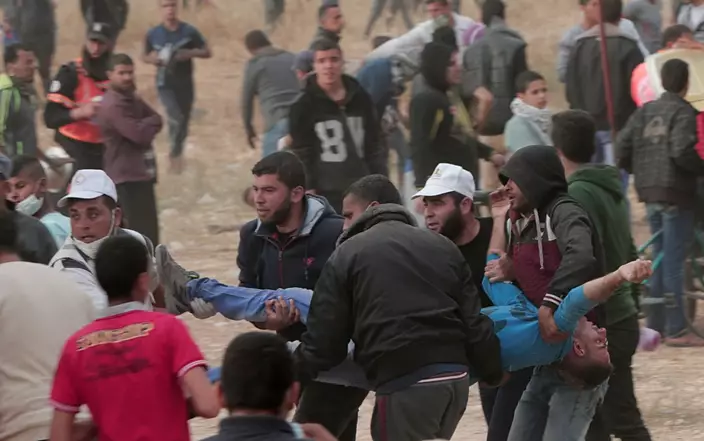
Palestinian protesters evacuate a wounded youth during clashes with Israeli troops along Gaza's border with Israel, east of Khan Younis, Gaza Strip, Friday, April 20, 2018. (AP Photo/Adel Hana)
More than 150 Palestinians were wounded Friday, in the fourth round of weekly Hamas-led mass protests in the border area.
The teen, Mohammed Ayyoub, was about 150 meters (yards) from the fence when he was hit, Gaza photographer Abed Alhakeem Abu Rish told The Associated Press. He said that the boy was about to take cover when he was shot and fell to the ground, collapsing head first. The Israeli military says it is investigating the incident.
The latest deaths brought to 32 the number of Palestinians killed by Israeli troops in protests since late March. More than 1,600 have been wounded by live rounds in the past three weeks, according to the Gaza Health Ministry.
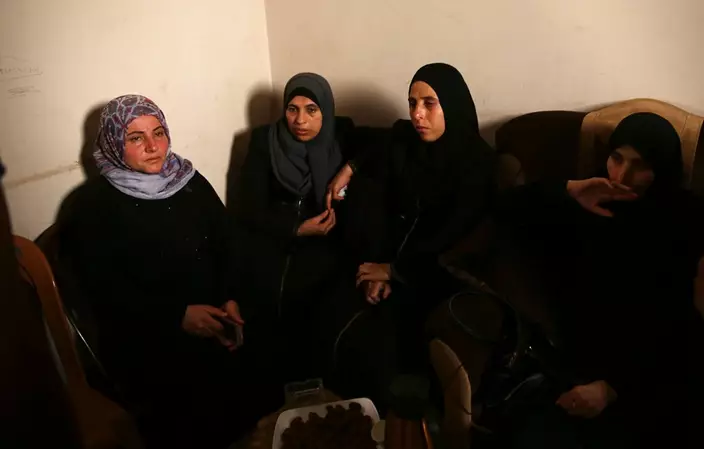
Relatives mourn at the family house of Mohammed Ayyoub, 14, who was killed during a protest along Gaza's border with Israel, east of Jebaliya Yesterday, in Jebaliya refugee camp, Gaza Strip, Saturday, April 21, 2018. (AP Photo/Adel Hana)
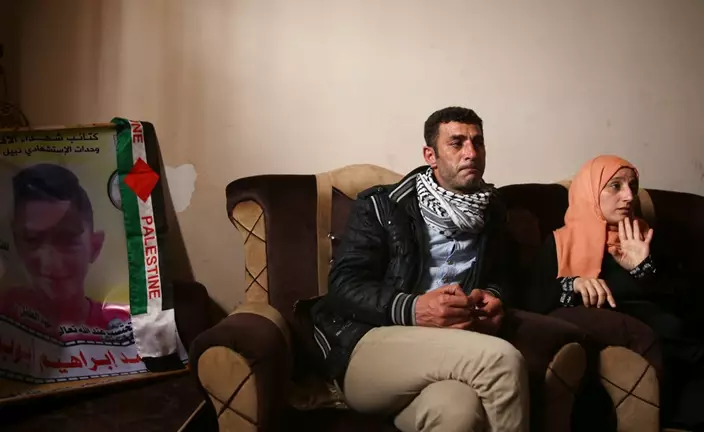
Raeda Ayyoub, the mother of Mohammed, 14, who was killed during a protest along Gaza's border with Israel, east of Jebaliya Yesterday, reacts while sits near her husband Ibrahim, during interview at her family house in Jebaliya refugee camp, Gaza Strip, Saturday, April 21, 2018.(AP Photo/Adel Hana)
The rising Palestinian casualty toll signaled that Israel's military is sticking to its open-fire rules despite international criticism of the use of lethal force against unarmed protesters.
Israel has said it is defending its sovereign border, including Israeli communities on the other side. It has alleged that Hamas uses the protests as cover for attacks and for damaging the border fence.
Late Saturday, the military released photos and videos depicting what it has said it is trying to counter. In one image, young boys, under the cover of smoke, are seen charging the fence and uprooting part of it to allow for an infiltration.
The military said it had distributed leaflets warning the residents of Gaza to stay away from the fence but alleged that "the terror organizations in the Gaza Strip continue to exploit civilians, including many youth and children, while putting them in unnecessary danger."
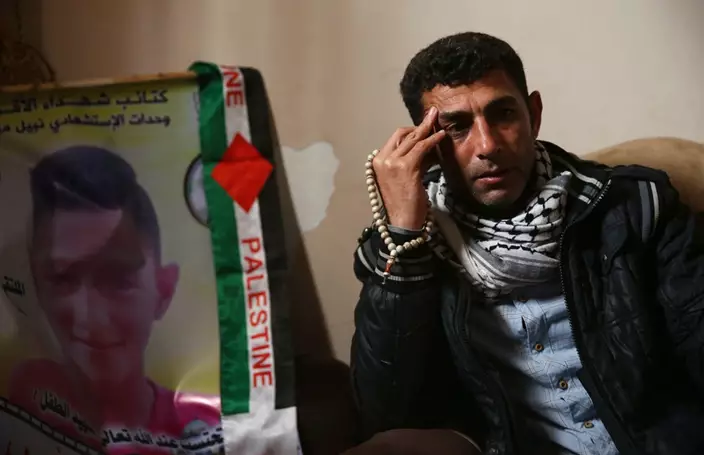
Ibrahim Ayyoub, 42, the father of Mohammed, 14, who was killed during a protest along Gaza's border with Israel, east of Jebaliya Yesterday, reacts while sits near son's photo during interview at his family house in Jebaliya refugee camp, Gaza Strip, Saturday, April 21, 2018. (AP Photo/Adel Hana)
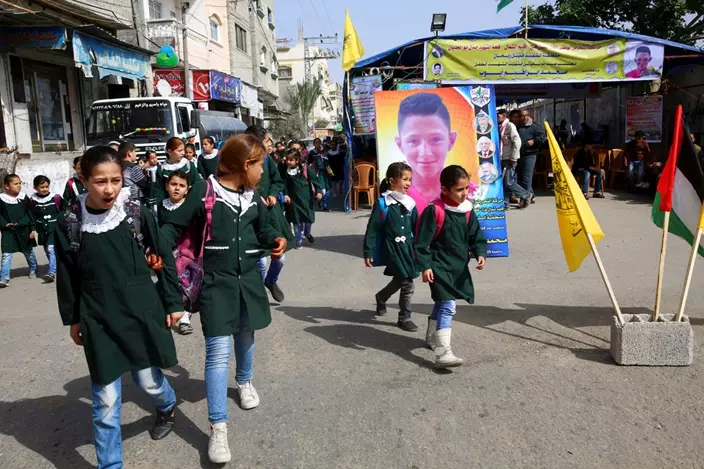
School girls look while pass the house morning of Mohammed Ayyoub, 14, who was killed during a protest along Gaza's border with Israel, east of Jebaliya Yesterday, at the main road in Jebaliya refugee camp, Gaza Strip, Saturday, April 21, 2018. (AP Photo/Adel Hana)
Rights groups have said Israel's open-fire orders are unlawful because they effectively allow soldiers to open fire on unarmed demonstrators.
The marches are part of what organizers have billed as an escalating showdown with Israel, to culminate in a mass march on May 15.
The top Hamas leader, Ismail Haniyeh, said Friday that people should get ready for large crowds spilling across the border that day.
"Our people will outnumber the occupation and force it from our land," he said, referring to Israel.
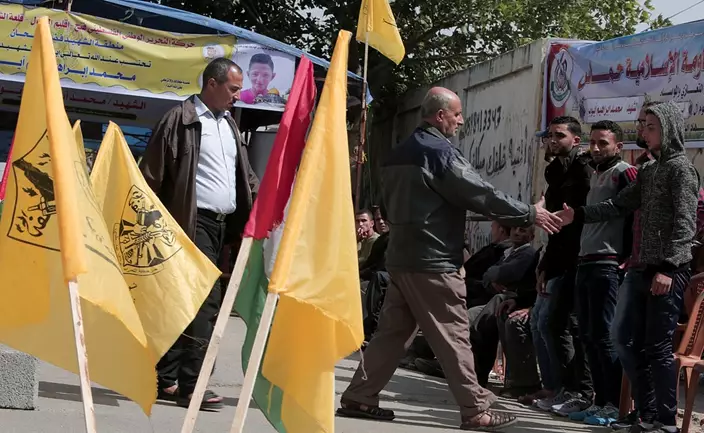
Residents pay respect as they arrive to the house morning of Mohammed Ayyoub, 14, who was killed during a protest along Gaza's border with Israel, east of Jebaliya Yesterday, at the main road in Jebaliya refugee camp, Gaza Strip, Saturday, April 21, 2018. (AP Photo/Adel Hana)
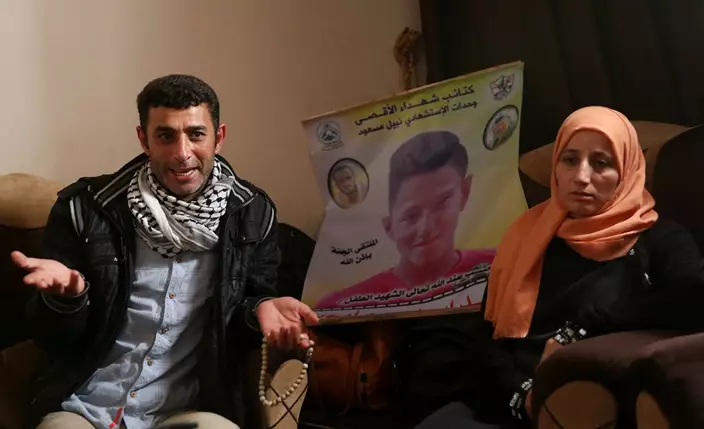
Ibrahim Ayyoub, 42, the father of Mohammed, 14, who was killed during a protest along Gaza's border with Israel, east of Jebaliya Yesterday, reacts while sits near his wafe's Raeda, during interview at his family house in Jebaliya refugee camp, Gaza Strip, Saturday, April 21, 2018. (AP Photo/Adel Hana)
The latest killings sparked new demands by a senior U.N. official and by the E.U. for an investigation.
Nikolay Mladenov, a top U.N. envoy in the region, said on Twitter that it is "outrageous to shoot at children."
The European Union urged the Israeli military to "refrain from using lethal force against unarmed protesters."
Mohammed Ayyoub's father, Ibrahim, said Saturday that his son was killed in cold blood.
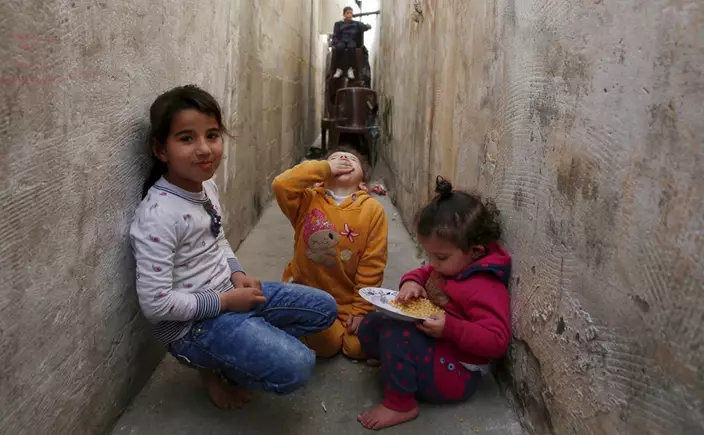
Children eat in an alley outside the house of Mohammed Ayyoub, 14, in the Jebaliya refugee camp, Gaza Strip, Saturday, April 21, 2018, as relatives mourn his death. The teenage boy was one of four Palestinians killed Friday by Israeli troops firing from across the fence in the fourth round of weekly Hamas-led protests near the border. (AP Photo/Adel Hana)
"Mohammed did not deserve to be executed," the 42-year-old said as mourners streamed to the family's shack in the Jebaliya refugee camp. "He was not holding a stone or a gun ... Mohammed was not running toward the fence."
The Israeli military said Saturday that all reports of fatal shootings by Israeli soldiers, including that of the teen "are thoroughly checked by the relevant command echelons," examined by a fact-finding "assessment mechanism" and findings transferred to the military advocate general.
Lieberman, the Israeli defense minister, said on Twitter that "the only culprits in the death of the ... boy in Gaza are Hamas leaders."
He said they are "cowardly leaders who hide behind women and children and send them forward as a human shield, so that they can continue to dig tunnels and carry out terrorist actions against" Israel.
Hamas says the protests are aimed at breaking a border blockade that was imposed by Israel and Egypt after the Islamic militant group overran Gaza in 2007, a year after winning Palestinian parliament elections.
The marches also press for a "right of return" of Palestinian refugees and their descendants to what is now Israel. Hundreds of thousands of Palestinians fled or were forced from homes in the 1948 war over Israel's creation. Palestinians mark May 15, the anniversary of Israel's founding, as their "nakba," or catastrophe, to mourn their mass uprooting.
While Hamas and smaller Palestinian factions have taken a lead as organizers, the mass marches are also fueled by growing desperation among Gaza's 2 million residents.
The border blockade has trapped nearly all of them in the tiny coastal territory, gutted the economy and deepened poverty. Gaza residents typically get fewer than five hours of electricity per day, while unemployment has soared above 40 percent.
NEW YORK (AP) — What began last week when Columbia University students refused to end their protest against Israel’s war with Hamas had turned into a much larger movement by Tuesday as students across the nation set up encampments, occupied buildings and ignored demands to leave.
Protests had been bubbling for months but kicked into a higher gear after more than 100 pro-Palestinian demonstrators who had camped out on Columbia's upper Manhattan campus were arrested Thursday. Dozens more protesters have been arrested at other campuses since, and many now face charges of trespassing or disorderly conduct.
With tensions at Columbia continuing to run high and some students afraid to set foot on the campus, officials said the Ivy League school will switch to hybrid learning for the rest of the semester, which will be finished by the end of next week.
At nearby New York University, police said 133 protesters were taken into custody late Monday and all had been released with summonses to appear in court on disorderly conduct charges. New York City Mayor Eric Adams said police officers were hit with bottles and other objects at some of this week’s protests.
In Connecticut, police arrested 60 protesters — including 47 students — Monday at Yale University, after they refused to leave an encampment on a plaza at the center of campus.
Yale President Peter Salovey said protesters had declined an offer to end the demonstration and meet with trustees. After several warnings, school officials determined “the situation was no longer safe,” so police cleared the encampment and made arrests.
In the Midwest on Tuesday, a demonstration at the center of the University of Michigan campus had grown to nearly 40 tents, and nine anti-war protesters at the University of Minnesota were arrested after police took down an encampment in front of the library. Hundreds rallied to the Minnesota campus in the afternoon to demand their release.
On the West Coast, California State Polytechnic University, Humboldt, announced that its campus would be closed through Wednesday after demonstrators occupied a building Monday night. Three protesters were arrested. Classes were to be conducted remotely, the school said on its website.
Since the war in Gaza began, colleges and universities have struggled to balance safety with free speech rights. Many long tolerated protests but are now doling out more heavy-handed discipline.
Harvard University in Massachusetts has tried to stay a step ahead of protests by locking most gates into its famed Harvard Yard and limiting access to those with school identification. The school has also posted signs that warn against setting up tents or tables on campus without permission.
Literature Ph.D. student Christian Deleon said he understood why the Harvard administration may be trying to avoid protests but said there still has to be a place for students to express what they think.
“We should all be able to use these kinds of spaces to protest, to make our voices heard,” he said.
Ben Wizner, a lawyer with the American Civil Liberties Union, said college leaders faced extremely tough decisions because they had a responsibility to ensure people could express their views, even when others found them offensive.
“But they also need to protect students from targeted harassment, threats and intimidation," he said. “And sometimes that line can seem like a gray one.”
The New York Civil Liberties Union cautioned universities against being too quick to call in law enforcement in a statement Tuesday.
“Officials should not conflate criticism of Israel with antisemitism or use hate incidents as a pretext to silence political views they oppose,” said Donna Lieberman, the group’s executive director.
Leo Auerbach, a student at the University of Michigan, said the differing stances on the war hadn’t led to his feeling unsafe on campus but he has been fearful of the “hateful rhetoric and antisemitic sentiment being echoed.”
“If we’re trying to create an inclusive community on campus, there needs to be constructive dialogue between groups,” Auerbach said. “And right now, there’s no dialogue that is occurring.”
At the Massachusetts Institute of Technology, physics senior Hannah Didehbani said protesters were inspired by those at Columbia.
“Right now there are several professors on campus who are getting direct research funding from Israel’s ministry of defense,” she said. “We’ve been calling for MIT to cut those research ties.”
Protesters at the University of California, Berkeley, which had an encampment of about 30 tents Tuesday, were also inspired by Columbia's demonstrators, “who we consider to be the heart of the student movement,” said law student Malak Afaneh.
Columbia President Minouche Shafik said in a message to the school community Monday that she was “deeply saddened” by what was happening on the campus, where some Jewish students say the criticism of Israel has veered into antisemitism.
U.S. House Speaker Mike Johnson planned a trip to visit Jewish students at the university on Wednesday and address antisemitism on college campuses in a press conference.
Columbia has a history of protest, most notably in 1968, when hundreds of students angry about racism and the Vietnam War occupied five campus buildings. After a week, a thousand police officers swept in and cleared them out, making 700 arrests. The Associated Press reported at the time that 100 students and 15 police officers were injured.
Campus protests began after Hamas’ deadly attack on southern Israel, when militants killed about 1,200 people, most of them civilians, and took roughly 250 hostages. During the ensuing war, Israel has killed more than 34,000 Palestinians in the Gaza Strip, according to the local health ministry, which doesn’t distinguish between combatants and noncombatants but says at least two-thirds of the dead are children and women.
Perry reported from Meredith, New Hampshire. Associated Press writers Will Weissert in Triangle, Virginia; Larry Lage in Ann Arbor, Michigan; Steve LeBlanc in Cambridge, Massachusetts; Dave Collins in Hartford, Connecticut; Jim Salter in O’Fallon, Missouri; Haven Daley in San Francisco; and John Antczak in Los Angeles contributed to this report.
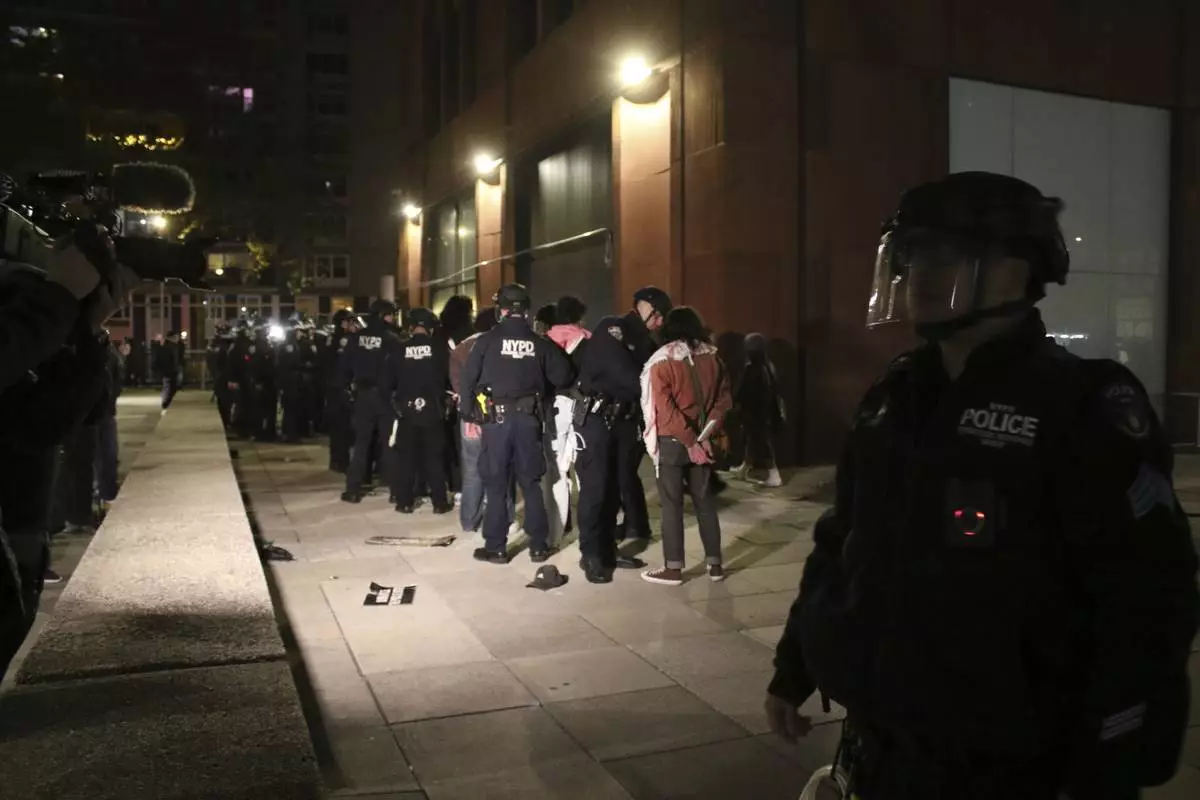
New York City Police Department officers arrest pro-Palestinian protesters outside a student-led encampment at New York University on Monday, April 22, 2024, in New York. The protest and encampment was set up to demand the university divest from weapons manufacturers and the Israeli government. The NYPD said 133 protesters were taken into custody on Monday, and all have been released with summonses to appear in court on disorderly conduct charges. (AP Photo/Noreen Nasir)
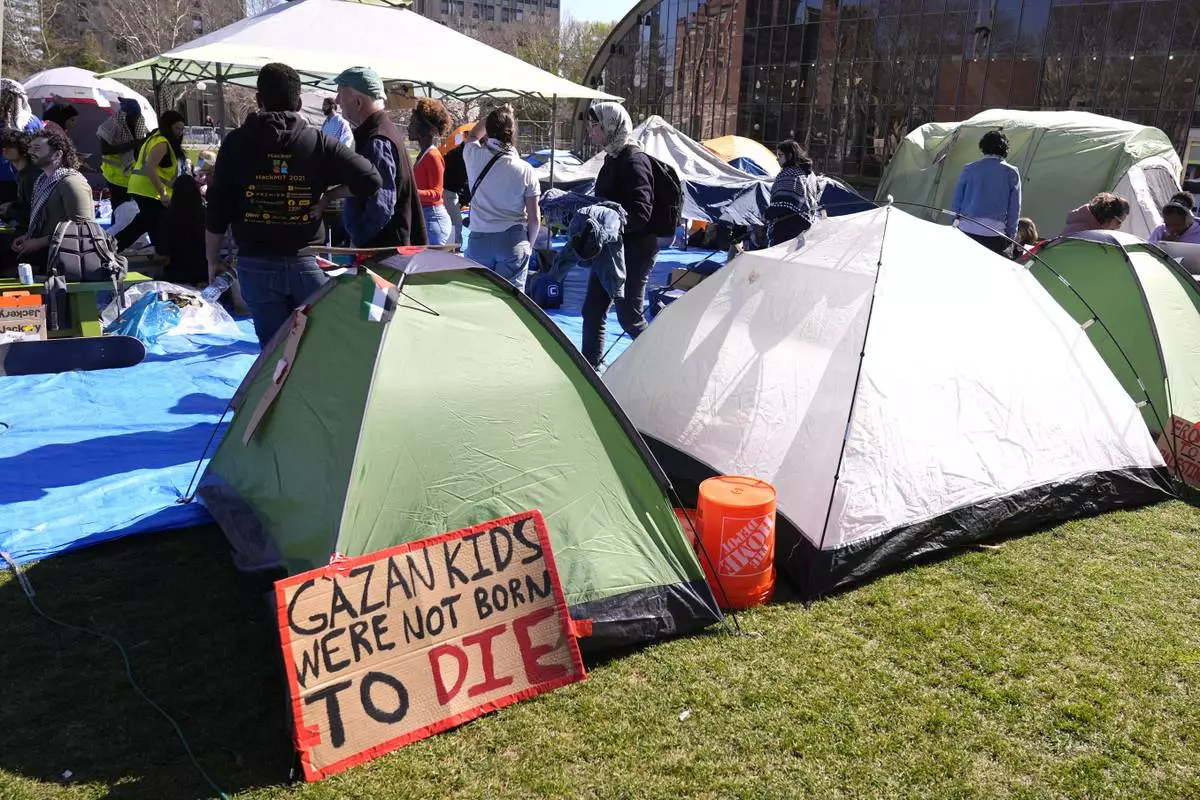
Students protest at an encampment on the campus of the Massachusetts Institute of Technology, Tuesday, April 23, 2024, in Cambridge, Mass. (AP Photo/Charles Krupa)
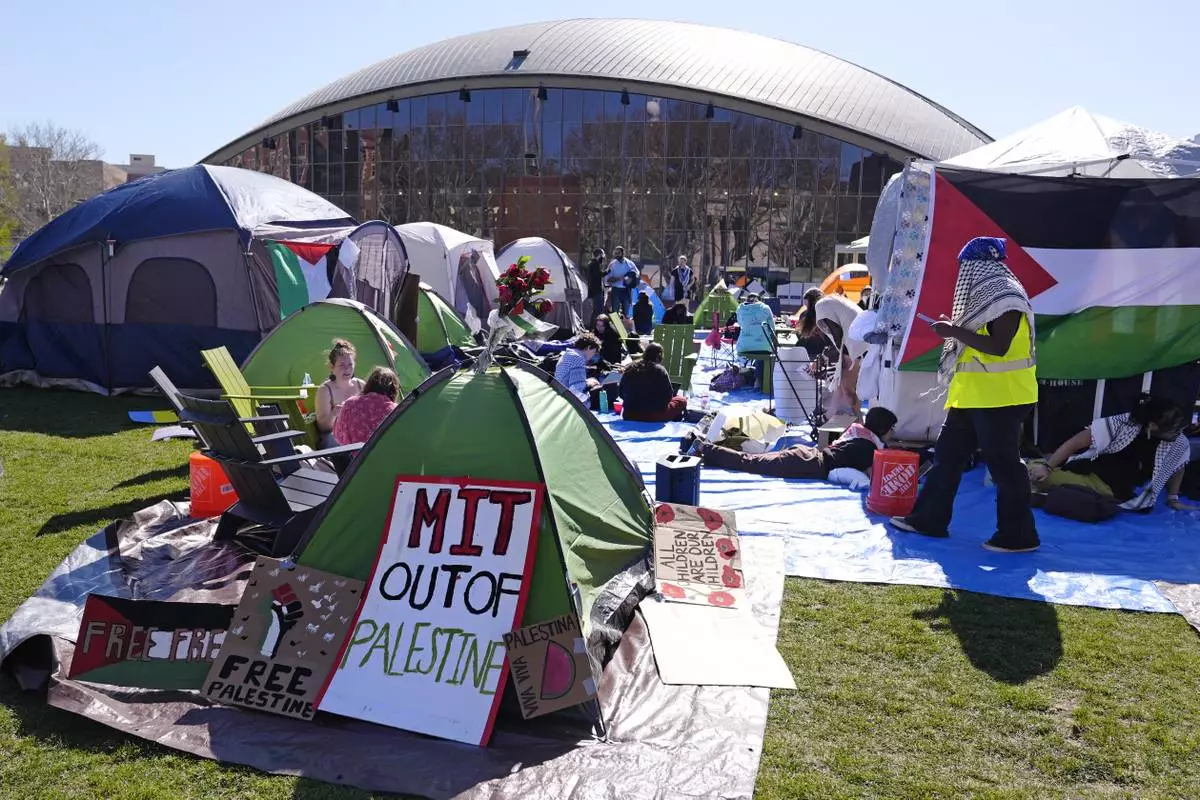
Students protest at an encampment outside the Kresge Auditorium on the campus of the Massachusetts Institute of Technology, Tuesday, April 23, 2024, in Cambridge, Mass. (AP Photo/Charles Krupa)

Pro-Palestinian protesters gather in front of Sproul Hall on the campus of the University of California, Berkeley in Berkeley, Calif., Tuesday, April 23, 2024. The Israel-Hamas war protests creating friction at universities across the United States escalated Tuesday as some colleges encouraged students to attend classes remotely and dozens faced charges after setting up tents on campuses and ignoring official requests to leave. (AP Photo/Haven Daley)

New York City Police Department officers arrest pro-Palestinian protesters outside a student-led encampment at New York University on Monday night, April 22, 2024, in New York. The protest and encampment was set up to demand the university divest from weapons manufacturers and the Israeli government. (AP Photo/Noreen Nasir)

Pro-Palestinian protesters gather near an encampment set up in front of Sproul Hall on the campus of the University of California, Berkeley in Berkeley, Calif., Tuesday, April 23, 2024. The Israel-Hamas war protests creating friction at universities across the United States escalated Tuesday as some colleges encouraged students to attend classes remotely and dozens faced charges after setting up tents on campuses and ignoring official requests to leave. (AP Photo/Haven Daley)
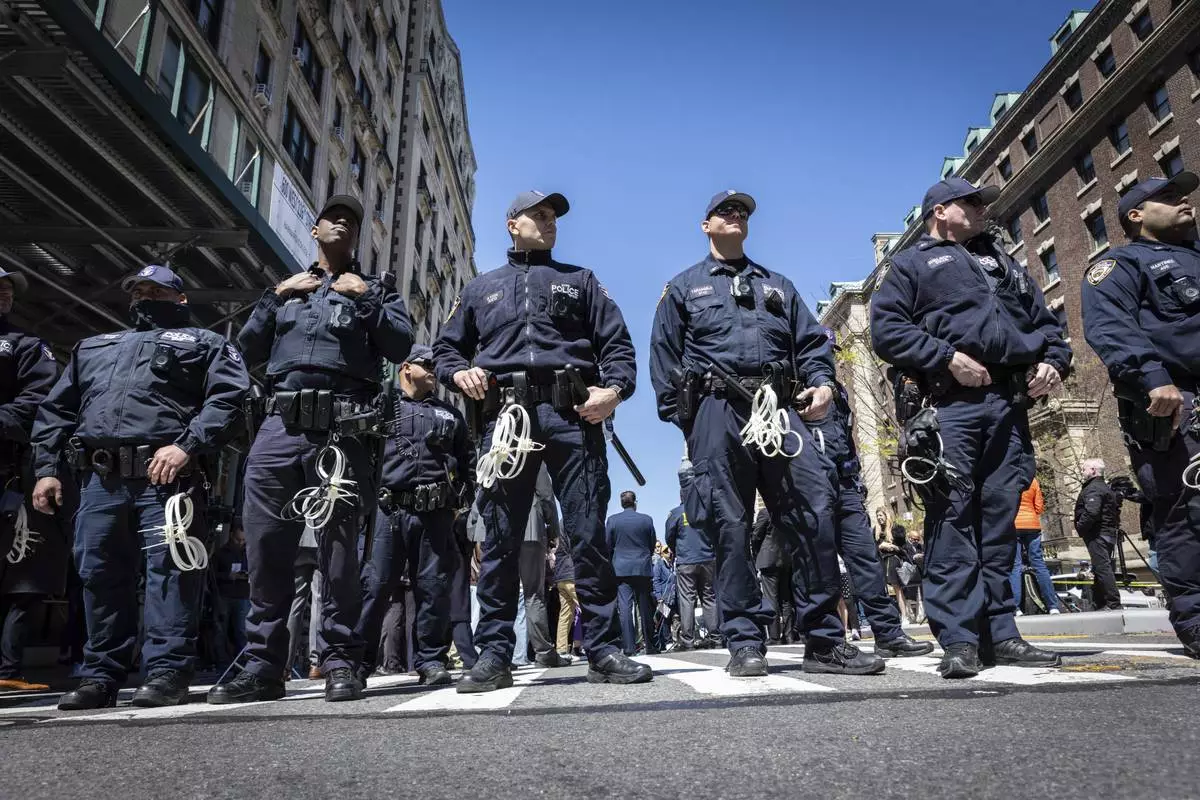
NYPD officers from the Strategic Response Group form a wall of protection around Deputy Commissioner of Legal Matters Michael Gerber and Deputy Commissioner of Operations Kay Daughtry, not in the picture, during a press conference regarding the ongoing pro-Palestinians protest encampment at Columbia University in New York on Monday, April 22, 2024. U.S. colleges and universities are preparing for end-of-year commencement ceremonies with a unique challenge: providing safety for graduates while honoring the free speech rights of students involved in protests over the Israel-Hamas war. (AP Photo/Stefan Jeremiah)
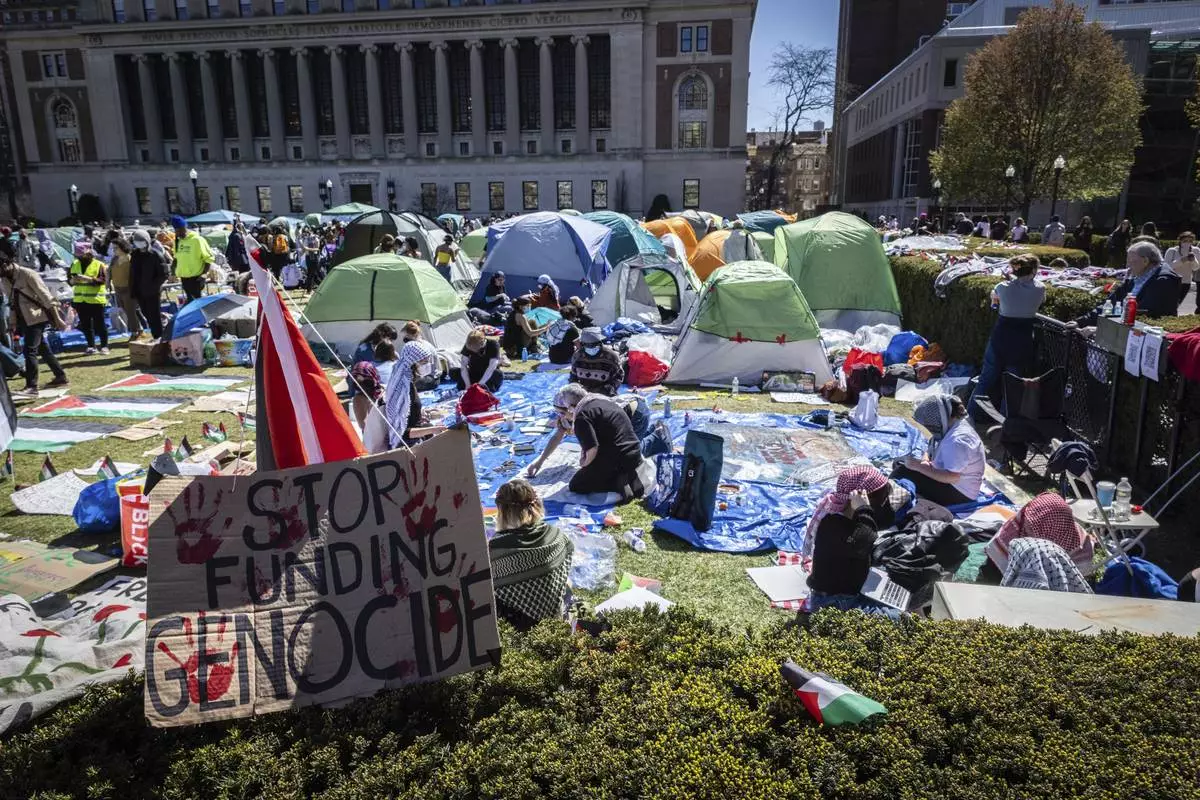
A sign sits erected at the pro-Palestinian demonstration encampment at Columbia University in New York, Monday, April 22, 2024. U.S. colleges and universities are preparing for end-of-year commencement ceremonies with a unique challenge: providing safety for graduates while honoring the free speech rights of students involved in protests over the Israel-Hamas war. (AP Photo/Stefan Jeremiah)
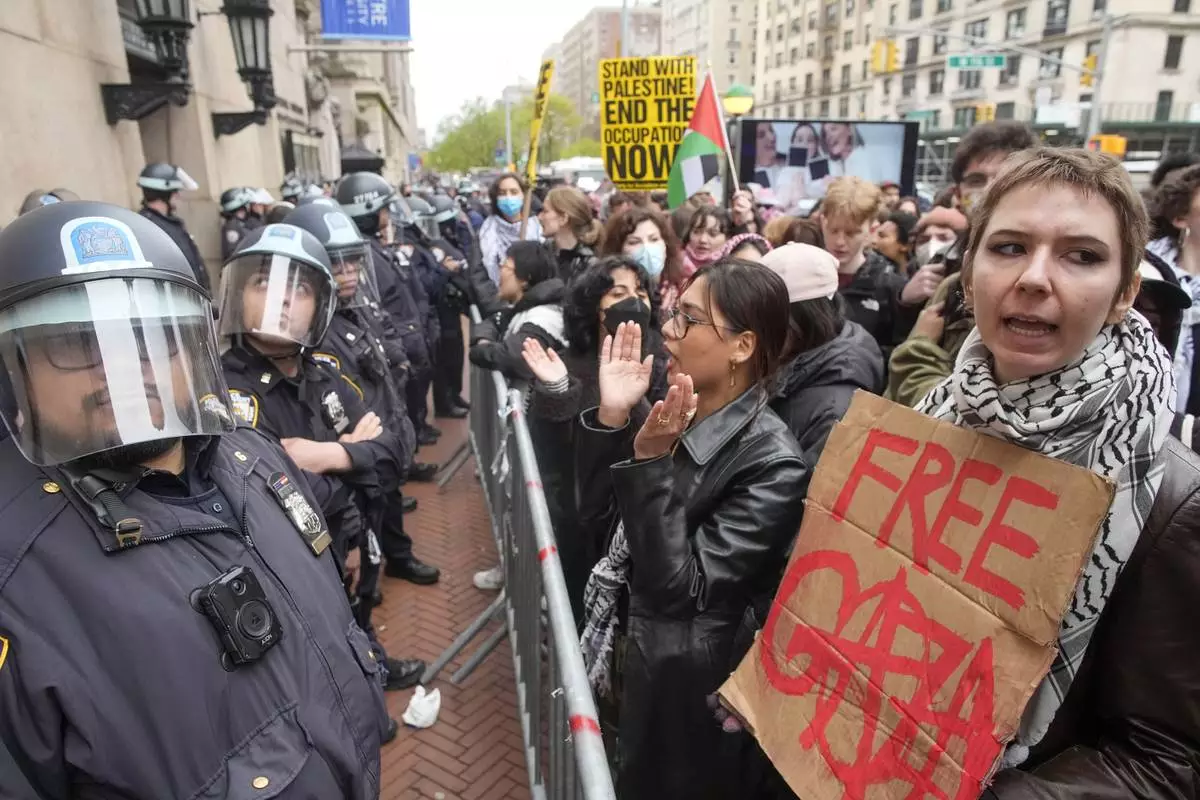
FILE - Police in Riot gear stand guard as demonstrators chant slogans outside the Columbia University campus, Thursday, April 18, 2024, in New York. U.S. colleges and universities are preparing for end-of-year commencement ceremonies with a unique challenge: providing safety for graduates while honoring the free speech rights of students involved in protests over the Israel-Hamas war. (AP Photo/Mary Altaffer, File)




















